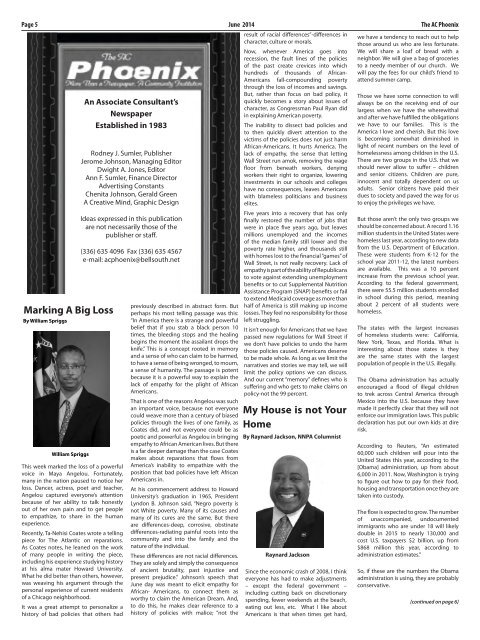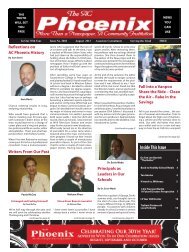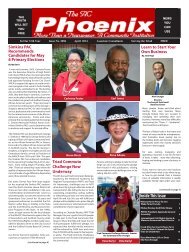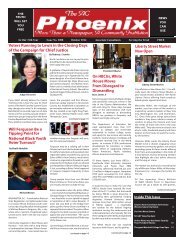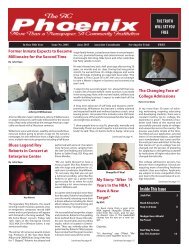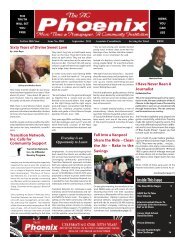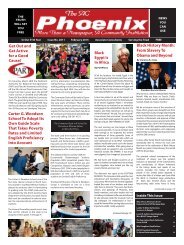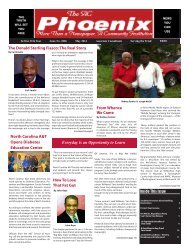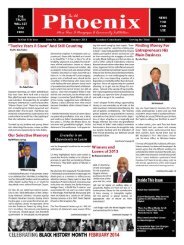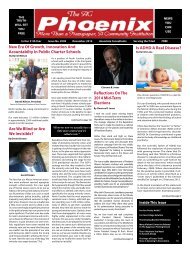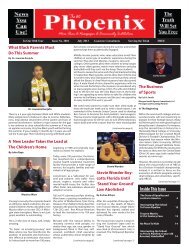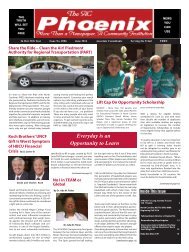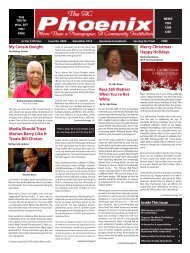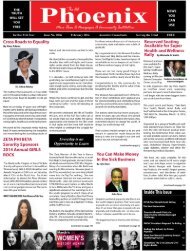The AC Phoenix: More than a Newspaper, a Community Institution -- Issue No. 2014, June 2014
You also want an ePaper? Increase the reach of your titles
YUMPU automatically turns print PDFs into web optimized ePapers that Google loves.
Page 5 <strong>June</strong> <strong>2014</strong> <strong>The</strong> <strong>AC</strong> <strong>Phoenix</strong><br />
Marking A Big Loss<br />
By William Spriggs<br />
William Spriggs<br />
This week marked the loss of a powerful<br />
voice in Maya Angelou. Fortunately,<br />
many in the nation paused to notice her<br />
loss. Dancer, actress, poet and teacher,<br />
Angelou captured everyone’s attention<br />
because of her ability to talk honestly<br />
out of her own pain and to get people<br />
to empathize, to share in the human<br />
experience.<br />
Recently, Ta-Nehisi Coates wrote a telling<br />
piece for <strong>The</strong> Atlantic on reparations.<br />
As Coates notes, he leaned on the work<br />
of many people in writing the piece,<br />
including his experience studying history<br />
at his alma mater Howard University.<br />
What he did better <strong>than</strong> others, however,<br />
was weaving his argument through the<br />
personal experience of current residents<br />
of a Chicago neighborhood.<br />
It was a great attempt to personalize a<br />
history of bad policies that others had<br />
An Associate Consultant’s<br />
<strong>Newspaper</strong><br />
Established in 1983<br />
Rodney J. Sumler, Publisher<br />
Jerome Johnson, Managing Editor<br />
Dwight A. Jones, Editor<br />
Ann F. Sumler, Finance Director<br />
Advertising Constants<br />
Chenita Johnson, Gerald Green<br />
A Creative Mind, Graphic Design<br />
Ideas expressed in this publication<br />
are not necessarily those of the<br />
publisher or staff.<br />
(336) 635 4096 Fax (336) 635 4567<br />
e-mail: acphoenix@bellsouth.net<br />
previously described in abstract form. But<br />
perhaps his most telling passage was this:<br />
“In America there is a strange and powerful<br />
belief that if you stab a black person 10<br />
times, the bleeding stops and the healing<br />
begins the moment the assailant drops the<br />
knife.” This is a concept rooted in memory<br />
and a sense of who can claim to be harmed,<br />
to have a sense of being wronged, to mourn,<br />
a sense of humanity. <strong>The</strong> passage is potent<br />
because it is a powerful way to explain the<br />
lack of empathy for the plight of African<br />
Americans.<br />
That is one of the reasons Angelou was such<br />
an important voice, because not everyone<br />
could weave more <strong>than</strong> a century of biased<br />
policies through the lives of one family, as<br />
Coates did, and not everyone could be as<br />
poetic and powerful as Angelou in bringing<br />
empathy to African American lives. But there<br />
is a far deeper damage <strong>than</strong> the case Coates<br />
makes about reparations that flows from<br />
America’s inability to empathize with the<br />
position that bad policies have left African<br />
Americans in.<br />
At his commencement address to Howard<br />
University’s graduation in 1965, President<br />
Lyndon B. Johnson said, “Negro poverty is<br />
not White poverty. Many of its causes and<br />
many of its cures are the same. But there<br />
are differences-deep, corrosive, obstinate<br />
differences-radiating painful roots into the<br />
community and into the family and the<br />
nature of the individual.<br />
<strong>The</strong>se differences are not racial differences.<br />
<strong>The</strong>y are solely and simply the consequence<br />
of ancient brutality, past injustice and<br />
present prejudice.” Johnson’s speech that<br />
<strong>June</strong> day was meant to elicit empathy for<br />
African- Americans, to connect them as<br />
worthy to claim the American Dream. And,<br />
to do this, he makes clear reference to a<br />
history of policies with malice; “not the<br />
result of racial differences”-differences in<br />
character, culture or morals.<br />
<strong>No</strong>w, whenever America goes into<br />
recession, the fault lines of the policies<br />
of the past create crevices into which<br />
hundreds of thousands of African-<br />
Americans fall-compounding poverty<br />
through the loss of incomes and savings.<br />
But, rather <strong>than</strong> focus on bad policy, it<br />
quickly becomes a story about issues of<br />
character, as Congressman Paul Ryan did<br />
in explaining American poverty.<br />
<strong>The</strong> inability to dissect bad policies and<br />
to then quickly divert attention to the<br />
victims of the policies does not just harm<br />
African-Americans. It hurts America. <strong>The</strong><br />
lack of empathy, the sense that letting<br />
Wall Street run amok, removing the wage<br />
floor from beneath workers, denying<br />
workers their right to organize, lowering<br />
investments in our schools and colleges<br />
have no consequences, leaves Americans<br />
with blameless politicians and business<br />
elites.<br />
Five years into a recovery that has only<br />
finally restored the number of jobs that<br />
were in place five years ago, but leaves<br />
millions unemployed and the incomes<br />
of the median family still lower and the<br />
poverty rate higher, and thousands still<br />
with homes lost to the financial “games” of<br />
Wall Street, is not really recovery. Lack of<br />
empathy is part of the ability of Republicans<br />
to vote against extending unemployment<br />
benefits or to cut Supplemental Nutrition<br />
Assistance Program (SNAP) benefits or fail<br />
to extend Medicaid coverage as more <strong>than</strong><br />
half of America is still making up income<br />
losses. <strong>The</strong>y feel no responsibility for those<br />
left struggling.<br />
It isn’t enough for Americans that we have<br />
passed new regulations for Wall Street if<br />
we don’t have policies to undo the harm<br />
those policies caused. Americans deserve<br />
to be made whole. As long as we limit the<br />
narratives and stories we may tell, we will<br />
limit the policy options we can discuss.<br />
And our current “memory” defines who is<br />
suffering and who gets to make claims on<br />
policy-not the 99 percent.<br />
My House is not Your<br />
Home<br />
By Raynard Jackson, NNPA Columnist<br />
Raynard Jackson<br />
Since the economic crash of 2008, I think<br />
everyone has had to make adjustments<br />
– except the federal government –<br />
including cutting back on discretionary<br />
spending, fewer weekends at the beach,<br />
eating out less, etc. What I like about<br />
Americans is that when times get hard,<br />
we have a tendency to reach out to help<br />
those around us who are less fortunate.<br />
We will share a loaf of bread with a<br />
neighbor. We will give a bag of groceries<br />
to a needy member of our church. We<br />
will pay the fees for our child’s friend to<br />
attend summer camp.<br />
Those we have some connection to will<br />
always be on the receiving end of our<br />
largess when we have the wherewithal<br />
and after we have fulfilled the obligations<br />
we have to our families. This is the<br />
America I love and cherish. But this love<br />
is becoming somewhat diminished in<br />
light of recent numbers on the level of<br />
homelessness among children in the U.S.<br />
<strong>The</strong>re are two groups in the U.S. that we<br />
should never allow to suffer – children<br />
and senior citizens. Children are pure,<br />
innocent and totally dependent on us<br />
adults. Senior citizens have paid their<br />
dues to society and paved the way for us<br />
to enjoy the privileges we have.<br />
But those aren’t the only two groups we<br />
should be concerned about. A record 1.16<br />
million students in the United States were<br />
homeless last year, according to new data<br />
from the U.S. Department of Education.<br />
<strong>The</strong>se were students from K-12 for the<br />
school year 2011-12, the latest numbers<br />
are available. This was a 10 percent<br />
increase from the previous school year.<br />
According to the federal government,<br />
there were 55.5 million students enrolled<br />
in school during this period, meaning<br />
about 2 percent of all students were<br />
homeless.<br />
<strong>The</strong> states with the largest increases<br />
of homeless students were: California,<br />
New York, Texas, and Florida. What is<br />
interesting about those states is they<br />
are the same states with the largest<br />
population of people in the U.S. illegally.<br />
<strong>The</strong> Obama administration has actually<br />
encouraged a flood of illegal children<br />
to trek across Central America through<br />
Mexico into the U.S. because they have<br />
made it perfectly clear that they will not<br />
enforce our immigration laws. This public<br />
declaration has put our own kids at dire<br />
risk.<br />
According to Reuters, “An estimated<br />
60,000 such children will pour into the<br />
United States this year, according to the<br />
[Obama] administration, up from about<br />
6,000 in 2011. <strong>No</strong>w, Washington is trying<br />
to figure out how to pay for their food,<br />
housing and transportation once they are<br />
taken into custody.<br />
<strong>The</strong> flow is expected to grow. <strong>The</strong> number<br />
of unaccompanied, undocumented<br />
immigrants who are under 18 will likely<br />
double in 2015 to nearly 130,000 and<br />
cost U.S. taxpayers $2 billion, up from<br />
$868 million this year, according to<br />
administration estimates.”<br />
So, if these are the numbers the Obama<br />
administration is using, they are probably<br />
conservative.<br />
[continued on page 6]


